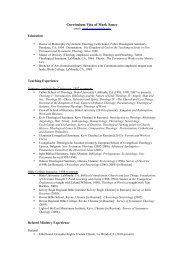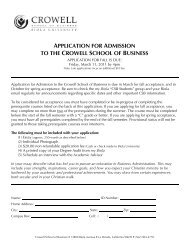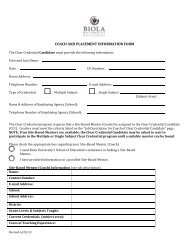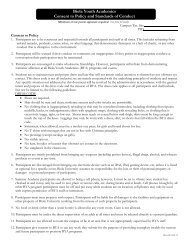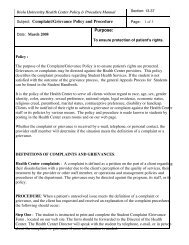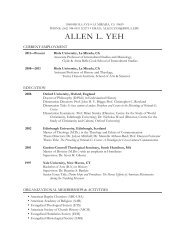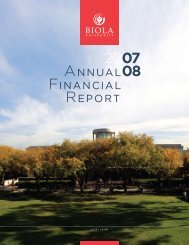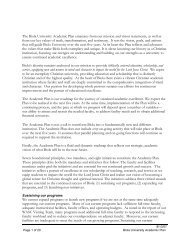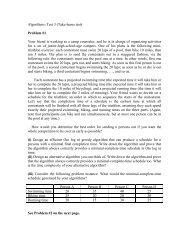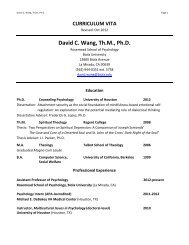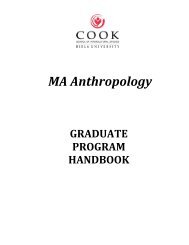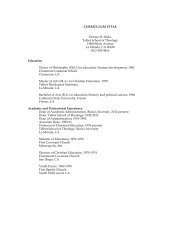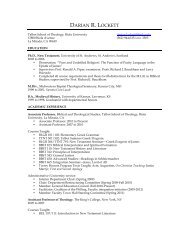You also want an ePaper? Increase the reach of your titles
YUMPU automatically turns print PDFs into web optimized ePapers that Google loves.
TESOL<br />
& Applied Linguistics (TAL)<br />
Faculty<br />
Chair: ...............................................................Katherine B. Purgason, Ph.D.<br />
Professor: .....................................................................................................Purnell<br />
Associate Professors: .................................................O’Herin, Purgason<br />
Assistant Professors: .............................................................Barber, Liang<br />
Objectives<br />
t e s o l (te aC h I n G e n G l I s h t o s P e a k e r s<br />
o f o t h e r l a n G UaG e s)<br />
English has become the most widely used language in the world<br />
today, particularly in the areas of science, commerce and education.<br />
Tens of thousands of students in developing countries are required<br />
to learn English in school. Thousands more study English in order<br />
to pursue careers or educational programs demanding English<br />
language skills. Refugees and immigrants to the United States desire<br />
English to survive and to establish themselves in their new homeland.<br />
There is thus a considerable demand for qualified teachers of<br />
English both here and abroad.<br />
To help meet the need for trained teachers of English as a Second<br />
Language (ESL) or English as a Foreign Language (EFL), the Department<br />
of TESOL and Applied Linguistics offers two regular programs<br />
in TESOL: a Certificate in TESOL and an M.A. in TESOL. The programs<br />
are academically rigorous, yet focus on the practical aspects of teaching<br />
in a variety of settings. The department also seeks to serve teachers<br />
desiring to continue their professional advancement or upgrade<br />
their qualifications, and non-degree students interested in gaining<br />
basic teaching or tutoring skills, by offering a variety of separate<br />
courses, from introductory to advanced.<br />
The Certificate in TESOL is designed to enable post-baccalaureate<br />
students to develop both a solid academic foundation in second<br />
language pedagogy and practical skills in teaching English in crosscultural<br />
situations.<br />
The M.A. in TESOL, encompasses the goal of the certificate program<br />
plus the additional goal of broader academic training. Teachers are<br />
equipped for work in and beyond the classroom in administration,<br />
training, course design, etc.<br />
Emphases of the TESOL graduate programs are: application of theory<br />
to teaching, language pedagogy, linguistic theory, crosscultural communication,<br />
materials design, program administration, professional<br />
ethics and research.<br />
The focus of the TESOL programs is post secondary and adult education.<br />
Those interested in K-12 ESL in U.S. schools should consult with<br />
the Education Dept.<br />
a P P l I e d l I n G U I s t I C s<br />
Although language teaching is a prominent area within the field of<br />
applied linguistics, there are many other areas of importance which<br />
address language-related human problems both in the United States<br />
and abroad. Among these are bilingual and multilingual education,<br />
language planning, lexicography, literacy, second language acquisition,<br />
translation, and the development or modification of writing<br />
systems.<br />
To address these areas, the department offers two programs: a<br />
Certificate in Linguistics and an M.A. in Applied Linguistics. Both programs<br />
are academically rigorous while, at the same time, maintaining<br />
a focus on the production of appropriate field-based analyses.<br />
The Certificate in linguistics provides graduate students with a basic<br />
foundation in linguistic analysis as well as in practical methods for<br />
understanding and learning a new language and culture. Those who<br />
satisfactorily complete the program should be able to function in a<br />
variety of cross-linguistic contexts.<br />
The M.A. in Applied Linguistics goes beyond the Certificate courses<br />
by providing advanced training in various areas of language analysis<br />
and by developing a multidisciplinary approach within which to seek<br />
appropriate solutions to real-world problems. Students may pursue<br />
either a generalist track or a specialized one by concentrating their<br />
electives in language surveys, linguistics, literacy, TESOL or translation.<br />
Students satisfactorily completing the TESOL concentration will<br />
receive the graduate Certificate in TESOL.<br />
s I l at b I o l a<br />
The Summer Institute of Linguistics (SIL) at <strong>Biola</strong> is associated with<br />
the department. This collaboration enriches the applied linguistics<br />
program by enabling students to get in one department the<br />
coursework needed for either a generalist or a specialist approach to<br />
culturally appropriate field-based projects, such as language surveys,<br />
literacy or translation. Experienced instructors who have served with<br />
Wycliffe Bible Translators cooperate in teaching a range of courses<br />
including language analysis, language learning, and Bible translation.<br />
These courses are equivalent to those offered at other SIL schools<br />
and are recognized as valid for membership in Wycliffe and other<br />
similar organizations.<br />
a d m I s s I o n r e Q U I r e m e n t s<br />
Applicants must meet the qualifications specified in the Admission<br />
to the School of Intercultural Studies section. In addition to<br />
these, foreign applicants who are non-native English speakers must<br />
demonstrate both spoken and written proficiency in English through<br />
an oral interview and by submitting their TOEFL (Test of English as a<br />
Foreign Language) results. The TOEFL must have been taken within<br />
the past five years. A score of 600 paper / 250 computer with a TWE<br />
score of 5 is normally required for admission to the graduate programs<br />
in the department. Non-native speakers are also expected to<br />
demonstrate oral English proficiency by means of an interview with<br />
a faculty member<br />
300 School of Intercultural Studies B I O L A U N I V E R S I T Y



